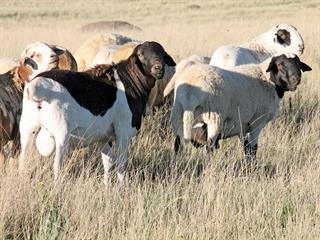In ONLY its second year, the Dryden Commercial Farmer Project near Bronkhorstspruit on the Gauteng/Mpumalanga border, has already grown to six emerging farmers, who have planted 896ha of grain. This is from starting out with only two farmers, who planted just over 200ha of maize and dry beans.
One of the farmers involved from the outset in this project, a joint venture between Absa AgriBusiness, Small Business, Omnia and Monsanto, admits there were a few hiccups in getting the loans approved before planting last October, but everything eventually worked out. “Last year I lost nearly everything because it was very dry,” says Andries Nkosi, “but this year, despite the late approval of the loans, I’ll be smiling all the way to the bank.” H e’s achieved a yield of 8,1t/ha of maize on dryland and has already harvested 98t of maize. “still can’t believe it,” Andries smiles.
“The project is now starting to bear fruit.” More service, less lip A ndries tells of his difficulties in the past in accessing loans from banks because of his lack of collateral. He also criticises the Land Bank, saying their advertisements to apply for a loan are just “lip service”. t was because he was a valued and long-standing customer of Omnia that he got where he is today. “used to get credit on the fertiliser bought from the company and always paid it back on time,” says Andries.
“Because of my good reputation, Omnia approached me about this project it was planning to do with and Monsanto.” market for your produce is the most important factor when granting a farmer a loan, according to Hans Balyamujura, AgriBusiness regional manager for Mpumalanga. “When emerging farmers want a loan from a commercial financier, they must have someone to buy their product. Without it, the risk is just too high.”
Andries’ eight years of farming have given him insight into the shortcomings of many government departments, including the agriculture department. “extension officers are in the dark!” says Andries. “right people are needed for that job, and found them at Monsanto. They helped me determine what could do to increase my production and yield a healthy crop.” bsa AgriBusiness manager Bankies Malan points out that without the involvement of Omnia and Monsanto, such an empowerment project would have been impossible.
“Each partner has a role and responsibilities,” he says. “Without that, a project such as this one would fall through.” Expanding out to reach further Bankies has reassured the farmers involved in the project that come planting time in October this year, the loans will be in order. “While money plays a part in successful production, Absa also assists the farmers with managing and monitoring the operational risk and imparts valuable financial information, like the factors that influence price,” explains Bankies. He adds that they need to ensure that proper skills transfer takes place, which is why they’re expanding slowly and deliberately.
While this might be the intention, Bankies confirms that the project will already be expanded to include 12 farmers in 2008/09, and the area planted will be increased to 2 500ha. He also confirms that Farmwise has joined the initiative and will, from next year, be purchasing all the grain harvested from the project. “And because it’s BEE grain, it will be purchased at a premium of between R20/t to R50/t.” he says. Triple the investment, triple the returns The total project is worth R4,6 million and is expected to yield 2 600t of grain this year, but will be increased to an investment of R12 million in the new season when the six additional farmers come on board. Boy Mokoena, who joined the project in the 2007/08 production season, farms with maize, sunflower, sorghum and Brahman-cross cattle. And he’s definitely not sitting on his laurels waiting for a handout.
“I’ve been farming since 1981 when I started out with 10ha of land,” says Boy. “I came to this area in 1987 and have been leasing land ever since. I’ve currently got about 500ha but am only using 360ha for the project. In October I will lease and plant on 1 000ha.” The late payment of the production loan was also quite a setback for Boy, but how he came through it and what he sacrificed just proves that he has farming in his blood. “I had to sell 300 of my Brahman cattle to buy seed and fertiliser,” says Boy. “That’s about R900 000 out of my own pocket.
But I’m getting about 3t/ha to 5t/ha of maize this year, so I’ll be able to make it up.” While none of the farmers own their own land yet, Andries explains that the project will enable them to put down collateral easier. “Because we’ve got a business model that works and is bringing in revenue, it already proves that we can and want to farm,” he says. Asked until when the emerging farmers will be supported by Absa AgriBusiness, Bankies says until they can stand on their own feet and support themselves commercially. “They’re not emerging farmers, but rather en-route commercial farmers,” he points out. |fw









